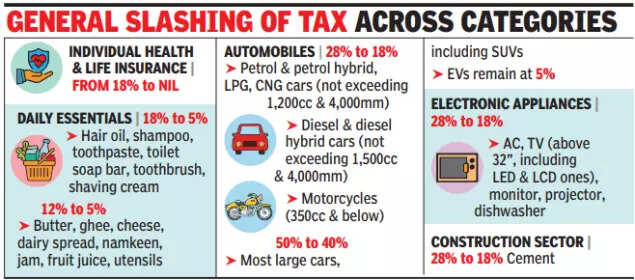Business
GST 2.0: Axis report predicts shift from capex to consumption-led growth; MSMEs, consumer sectors seen as key beneficiaries – The Times of India

The government’s announcement of Goods and Services Tax (GST) rationalisation under GST 2.0 signals a major change in India’s economic approach, moving from capex-led spending to a consumption-driven model, according to a report by Axis Securities.“The government has now shifted gears from capex-oriented spending to consumption-led spending,” the brokerage said, adding that the February 2025 Budget had already started this transition by introducing tax reliefs for rural households and the middle class.
As per news agency ANI, the report noted that over the last decade, infrastructure projects like roads, bridges and metro networks defined government policy. However, GST 2.0, approved in the 56th GST Council meeting on September 3, marks a new phase aimed at boosting demand. The reforms rationalise the structure by reducing slabs from four to three, scrapping the 12% and 28% categories. Most items now fall under 5% and 18%, while a 40% slab is reserved for sin goods. Certain essentials have been placed under a Nil GST rate to directly spur consumption. These changes will take effect from September 22, coinciding with Navratri’s first day.

As per ANI, Axis Securities said the move is expected to benefit MSMEs and SMEs and revive credit growth, while boosting consumer demand in sectors such as durables, retail, FMCG, automobiles, cement, real estate, and building materials. The report added that higher discretionary income will strengthen the consumer discretionary segment, eventually reviving private capex, which has remained weak.Union commerce and industry minister Piyush Goyal also described the GST reforms as “game-changing” and the “biggest reform since independence,” reported news agency PTI. He said the move would support demand across sectors, benefit every consumer, and play an important role in India’s growth journey towards becoming a developed country by 2047.

“Every stakeholder in the country, every consumer, stands to benefit,” Goyal said, urging industry to pass on the benefits. He credited Prime Minister Narendra Modi for leading what he called the “biggest ever reform that India has seen since independence.”The minister added that the reforms, coming ahead of the festive season, are like a “Diwali gift” that will not only reduce taxes on daily essentials but also create a virtuous cycle of greater demand, investment, and job creation.
Business
Volkswagen capex recalibration: Automaker pares 2030 investment to $186 bn; China, US headwinds grow – The Times of India

Volkswagen Group plans to invest €160 billion ($186 billion) through 2030, a scaled-down outlay that reflects tightening capital allocation as Europe’s largest automaker grapples with mounting pressure in its two biggest markets — China and the United States, Reuters reported.The investment figure, announced by Volkswagen CEO Oliver Blume, is part of the company’s rolling five-year capital expenditure plan, which is updated annually. The latest commitment compares with €165 billion earmarked for 2025–2029 and €180 billion for 2024–2028, with 2024 marking the peak year for spending.Since that peak, the group — which houses brands such as Porsche and Audi — has been squeezed by higher costs and weaker margins, hit by US tariffs on imported vehicles and intensifying competition in China. The strain has been felt most acutely at Porsche, which derives nearly half of its sales from the US and China combined.Porsche recently unveiled a significant rollback of its electric vehicle strategy as profits came under pressure. Speaking to Frankfurter Allgemeine Sonntagszeitung, Blume said the focus of the latest investment plan was firmly “on Germany and Europe,” particularly in products, technology and infrastructure.Blume added that discussions on an extended savings programme at Porsche are expected to continue into 2026. He also said he does not expect Porsche to grow in China, though localising production across the wider Volkswagen group remains an option. A China-specific Porsche model could make sense at some point, he said.On Audi, Blume noted that any decision on building a manufacturing plant in the United States would depend on whether Washington offers substantial financial support.Blume, who will step down as Porsche CEO in January to concentrate fully on running Volkswagen Group, said his recent contract extension as Volkswagen chief executive until 2030 signalled continued backing from the Porsche and Piëch families as well as the German state of Lower Saxony, the company’s largest shareholders.“But it is true, of course, that shareholders have suffered losses since Porsche went public three years ago. I, too, must face up to this criticism,” he said.
Business
From the California gold rush to Sydney Sweeney: How denim became the most enduring garment in American fashion

Jodie Foster, Billie Perkins, and Robert De Niro perform a scene in Taxi Driver directed by Martin Scorsese in 1976 in New York, New York.
Michael Ochs Archives | Moviepix | Getty Images
In the dwindling days of the California gold rush, the wife of a local miner faced a problem.
Her husband’s denim work pants kept ripping, so her tailor, Jacob Davis, had the idea to add copper rivets to key points of strain, like the pocket corners and the base of the button fly, to keep them from tearing.
Davis’ “riveted pants” soon became a roaring success and, unbeknownst to him at the time, marked the official birth of the blue jean, a garment that would transform fashion and come to represent the United States around the globe.
“It really has democratized American fashion and it also is the greatest export that we have sent to the world, because people identify jeans specifically with American Western culture,” said Shawn Grain Carter, a fashion professor at the Fashion Institute of Technology in New York. “It doesn’t matter your economic or social class. It doesn’t matter what your views are in terms of the political spectrum. Everybody wears denim.”
Jacob Davis
Courtesy: Levi Strauss & Co.
These days, denim is a major sales driver for retailers big and small, as the global denim market reached $101 billion this year, up 28% from 2020, according to data from market research company Euromonitor International. Major apparel companies from American Eagle to Levi Strauss are in a race to corner that market, leaning on A-list celebrities like Sydney Sweeney and Beyonce to win over shoppers and drive sales in an unsteady economy.
But if it weren’t for Levi Strauss, founder of the eponymous blue jeans company, Davis’ invention may not have gone far beyond the railroad town where it was created in the early 1870s.
How Levi’s created blue jeans
Soon after Davis created his riveted pants, called “waist overalls” or “overalls” at the time, they began selling like “hot cakes” and he needed a business partner to secure a patent, said Tracey Panek, Levi’s in-house historian. So he wrote to Strauss, a Bavarian-born immigrant who was running a successful wholesale business in San Francisco and had supplied Davis the denim he used to create his riveted pants.
“The secret of them Pents is the Rivits that I put in those Pockets and I found the demand so large that I cannot make them up fast enough,” Davis wrote Strauss in a letter, according to PBS.
Levi Strauss
Courtesy: Levi Strauss & Co.
Strauss, an “astute” businessman, recognized the opportunity and agreed to partner with Davis, said Panek.
“This would have been the first time that Levi was actually” manufacturing his own products, said Panek. “He was no longer just importing and selling other people’s goods. He was manufacturing himself and selling to retailers.”
On May 20, 1873, the two men secured a patent for the riveted pants and eventually opened a factory on Fremont Street, close to the modern-day Salesforce tower in San Francisco’s financial district.
They promised to offer workers the most durable jeans on the market and soon, business was booming.
Dude ranch duds and the American worker
Through Strauss’ connections as a wholesaler, the company’s riveted overalls soon spread across the U.S., becoming the garment of choice for working men everywhere: miners, cowboys, farmers – any role that required durable clothing.
Jeans were exclusively reserved for work settings at the time, but as emerging denim manufacturers vied for a similar customer base, they looked to expand their assortment to drive sales.
“Slowly and steadily into the 20th century, you start to see some of these manufacturers making variations,” said Sonya Abrego, a New York City-based fashion historian. “There was this one design called spring bottom pants that was kind of a more form fitted, a more dressed up, a slightly flared, maybe what the factory foreman would be wearing, right? As opposed to just the guy on the shop floor.”
In 1934, Levi created the first ever line of jeans for women. Around that time, denim started to become more popular in settings outside of work, primarily for activities like dude ranch vacations, camping and horseback riding.
“So they were kind of taking on a cowboy’s garment or a worker’s garment but wearing it in a … resort setting,” said Abrego.
Courtesy: Levi Strauss & Co.
Dude ranch vacations had become popular because there were finally highways connecting different parts of the country, and few were willing to venture to Europe during a war. Companies like Levi began releasing advertisements highlighting their denim as “dude ranch duds” and “authentic western riding wear” to capture shoppers looking for jeans to bring with them on vacation, according to archival advertisements from the time.
These cultural moments helped to expand denim beyond workers, but jeans didn’t become widespread casual attire until after World War II, when American fashion overall started to shift.
The rise of the backyard BBQ
By the time World War II ended, the mighty American consumer was beginning to emerge. For years, Americans had been forced to ration common goods like rubber, sugar and meat while simultaneously being encouraged to save their money by buying war bonds and socking away spare cash.
When the country shifted from wartime to peacetime, Americans were ready to splurge and soon began spending big on new cars, appliances and clothes.
“With a little bit more money to spend, you start seeing a bigger push for leisure clothes and fun clothes and play clothes, clothes to wear to backyard barbecues,” said Abrego. “Clothes that we would consider today as just like casual style.”
Courtesy: Levi Strauss & Co.
Slowly and surely, it became more and more acceptable for both men and women to wear jeans outside of work settings. Then, denim manufacturers made a push to allow jeans in schools.
“They wanted to sell to as many people as they possibly could,” said Abrego. “The idea that jeans are good for school means that they’re good for every day.”
By the time the 1960s hit, denim manufacturers had expanded their products and were selling a wide variety of colors, fits and styles. It became a symbol of the hippie movement and a mainstay on Hollywood sets.
Soon, denim was everywhere, and the 1970s brought the iconic bell bottom pants and the first iteration of the “designer jean” — denim pants being produced by labels and brands whose designs had nothing to do with work wear or western wear, like Calvin Klein and Gloria Vanderbilt.
Since then, denim has remained a constant in global fashion. While silhouettes, washes and fits have changed over time, jeans never really go out of style, which is what makes them so enduring, said Abrego.
“This is a design from 1873 … do we see anything else from 1873 on the street? It’s kind of wild if you think about it that way,” said Abrego. “We can talk about all the details, all the changes in manufacturing and all the different fits and finishes but it’s a recognizable thing, it’s still a pair of jeans. For me as a historian, that continuity is so compelling because I can’t really name anything else that has stayed the same to this degree.”
Business
Power as ‘currency’: Experts say data centre growth lifts demand; India poised for global leadership – The Times of India

India’s expanding data centre and artificial intelligence ecosystem could position the country as a global leader in power trade, with experts pointing to surplus electricity capacity and rapid reforms in the power distribution sector, according to speakers at a national conference on energy and technology.Speaking at the National Conference on AI and Machine Learning based solutions in the power sector, Jitendra Srivastava, chairman and managing director of REC Limited, said the rapid rise of AI and data centres is creating a new era where electricity itself becomes a strategic asset, according to ANI.“With the exploding growth of artificial intelligence, with the exploding growth of data centres, with the sheer amount of power required to function these places…We are going to see an era when power will be the currency and we are uniquely placed with its huge potential with its already surplus status. We are poised to become world leaders. We are in a position where we can show the world that power is a tradable commodity and we can be global leaders in this,” Srivastava said.The conference brought together solution providers and power distribution companies with the aim of enabling collaboration and innovation. Shashank Mishra, Joint Secretary in the Ministry of Power, said the initiative was designed to create a common platform for developing new solutions.“Today we are bringing together solution providers and distribution companies on a single platform where they can interact and develop new solutions and ideas. We are also presenting several innovative concepts in the form of solutions, and the best among them will be awarded by the Minister of Power,” Mishra told ANI.He added that the government expects the initiative to be “a transformative” step for the sector.Highlighting ongoing reforms, Srivastava said the Ministry of Power has been driving changes under the Revamped Distribution Sector Scheme (RDSS), with smart metering forming a core pillar of the programme. He stressed that the benefits of smart meters can be fully realised only with the use of advanced analytics.“To understand the advantages of smart metering, it is essential to leverage the power of artificial intelligence and machine learning,” he said, adding that such tools can aid anti-theft measures, load forecasting and system rationalisation.According to Srivastava, the conference seeks to demonstrate how AI- and machine learning-based tools can improve consumer services, assist electricity regulators and help discoms function more efficiently.India’s energy sector has strengthened significantly in recent years, balancing rising demand with sustainability goals. Citing International Energy Agency projections, speakers noted that emerging and developing economies will account for about 85 per cent of the growth in global electricity demand over the next three years, with India playing a central role.As of June 2025, India’s total installed power capacity stood at 476 GW, while power shortages have declined sharply from 4.2 per cent in 2013-14 to 0.1 per cent in 2024-25, according to official data.
-

 Sports6 days ago
Sports6 days agoIndia Triumphs Over South Africa in First ODI Thanks to Kohli’s Heroics – SUCH TV
-

 Tech6 days ago
Tech6 days agoGet Your Steps In From Your Home Office With This Walking Pad—On Sale This Week
-

 Fashion6 days ago
Fashion6 days agoResults are in: US Black Friday store visits down, e-visits up, apparel shines
-

 Entertainment6 days ago
Entertainment6 days agoSadie Sink talks about the future of Max in ‘Stranger Things’
-

 Politics6 days ago
Politics6 days agoElon Musk reveals partner’s half-Indian roots, son’s middle name ‘Sekhar’
-

 Tech6 days ago
Tech6 days agoPrague’s City Center Sparkles, Buzzes, and Burns at the Signal Festival
-

 Sports6 days ago
Sports6 days agoBroncos secure thrilling OT victory over Commanders behind clutch performances
-

 Entertainment6 days ago
Entertainment6 days agoNatalia Dyer explains Nancy Wheeler’s key blunder in Stranger Things 5






